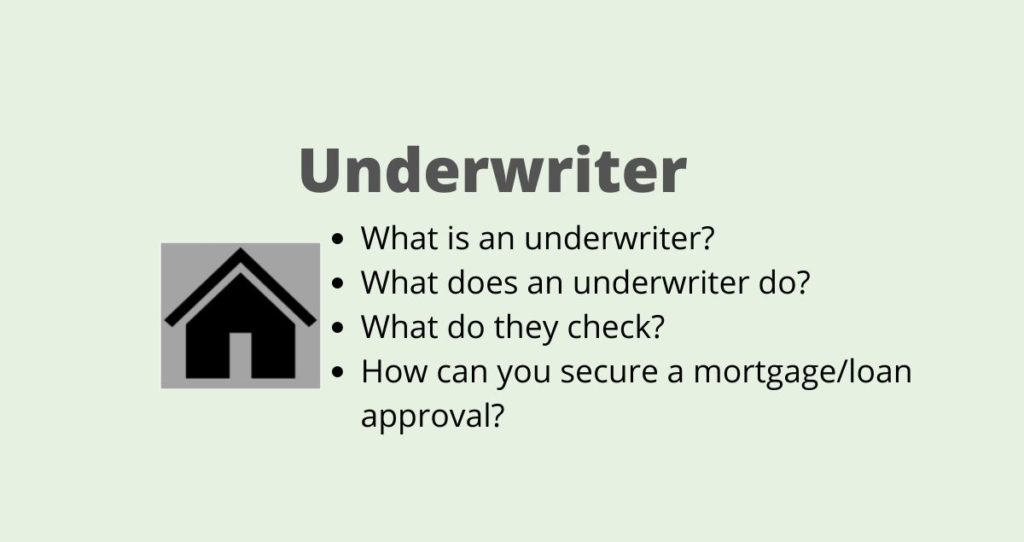What is an underwriter?
An underwriter is a member of a lending institution that reviews the credibility of mortgage/loan applicants. These individuals work for insurance, loan, and mortgage companies. Financial companies can have their own underwriter(s) or use external third-party underwriters.
What does an underwriter do?
The job of an underwriter is to determine the risk associated with a borrower using risk assessment methods. Lending money is a risky business, and for this reason, the moneylender must do a thorough investigation of the borrower before approving the loan application.
So, how does the underwriter works?
Let’s assume that you want a mortgage and are working with a mortgage broker. The broker will collect all information necessary from you and submit it to an underwriter who represents the lender (bank, credit union, or other lending institutions).
Once the underwriter receives your package, his/her job will begin. The main question he will need to answer is how risky it is to lend you money.
To know the answer to this question, everything related to you financially will be evaluated. That is the underwriter will check your credit score, credit history, other debts you have, your income and financial stability in general, assets, debt-to-income ratio, etc.
There are other factors that can determine the applicant’s approval rate and terms of the loan. As noted by SmartAsset, the underwriter will also evaluate the lender’s internal information, the type of the property, and its market value.
Furthermore, the underwriter can request more information from the borrower if necessary. For example, if pay stubs and W-2s collected by the mortgage broker do not support the borrower’s financial history; the underwriter can request more pay stubs and more W-2s.
After the risk assessment, the underwriter will then approve or deny the mortgage/loan application.
>>MORE: Debt To Income Ratio (DTI): What Is DTI?
When does the underwriter works on a loan application?
Since the underwriter approves or denies mortgage/loan applications; the underwriter works on applications after the buyer and seller have reached a mutual acceptance. That is both parties have agreed to enter the sale and the only thing left is contingencies.
What does the underwriter evaluate from the borrower?

The underwriter will evaluate the client’s credibility for the loan and associated risks.
The following are some of the factors the underwriter will assess.
- Appraisal: The appraisal is the process of analyzing the house in order to estimate its value. During the appraisal, an appraiser will do a thorough inspection of the house. In addition, the appraiser will compare the house with similar properties recently sold in the area known as comparables. After this process, the appraiser will come to an appraised value.
- Borrower’s income: The first and most important qualification a borrower needs is the ability to pay off the mortgage. That is you need to afford all your monthly mortgage payments. The only way the underwriter will know this information is through your pay stubs, W-2s, tax returns, and bank statements.
- Credit history: Your credit history covers pretty much every financial decision you have made. That is debts you had or still have such as student loans, car loans, your payment history, the outstanding balance of credit cards, etc. A good candidate is the one who has a solid credit history. That is you borrowed money from a lender and successfully paid it off without penalties, etc.
- Credit score: Your credit score plays an important role when buying a house. The lender will use it to estimate your approval rate, and more importantly, the interest rate you will be paying on the loan/mortgage. As noted by Rocket Mortgage, you will need at least a credit score of 620 for a conventional mortgage. The higher your credit score the better.
- Down payment: The money you are putting down comes in handy when determining your approval rate, interest rate, and the type of loan you can qualify for. In addition, without a 20% down payment the borrower must purchase mortgage insurance that protects the lender.
>>MORE: How To Pay Off Debt? 11 Tips You Can Use
How to get an underwriter approval?

Getting approved by an underwriter is much harder than having a pre-approval letter. This is because the underwriter will be making an investment decision on behalf of the lender. For this reason, the borrower must meet all requirements and standards set by the lender.
The following are some of the tricks to help you increase your chances of winning the underwriter’s approval.
- Have all documents required: Having every document needed is very important for you to secure the mortgage commitment letter. You can also provide optional documents to avoid any doubts or setbacks. You must always remember that the underwriter is looking for ways to deny your application.
- Have the lender submit your pre-approval package to the underwriter: A pre-approval letter implies that at least someone looked into your file and decided that you could qualify for a mortgage. Giving this information to the underwriter can increase your approval chances.
- Improve your credit score and debt-to-income ratio while house hunting: If your credit score was not good when you were getting the pre-approval letter, continue to pay off your debt and improve your credit score. There are chances that you will be in good standing by the time your package is submitted to the underwriter.
>>MORE: 8 Tips You Can Use To Improve Your Credit Score
What are the qualifications of an under writer?
As noted by the balance, an underwriter must meet the educational, certification, and work experience in their particular field. A bachelor’s degree is needed in either Accounting, finance, or economics. Some lending institutions can have more requirements and conduct background checks on their candidates.









